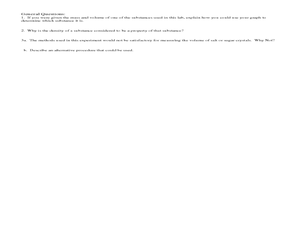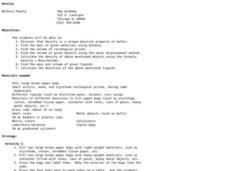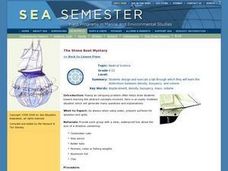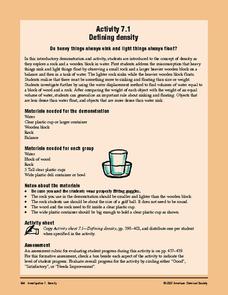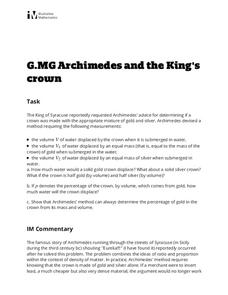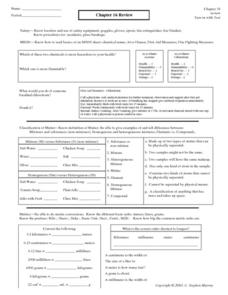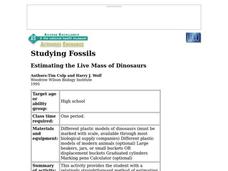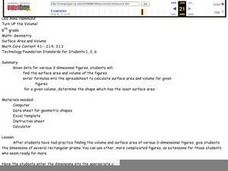American Chemical Society
Finding Volume: The Water Displacement Method
We have formulas for finding the volume of geometric shapes, but what if the shape is irregular? Lesson describes how to find volume through water displacement. After a demonstration, scholars practice in small groups. Then analysis...
Curated OER
Displacement of Water
To calculate the volume of a stopper by using the method of water displacement., students work with a web animation. They observe the method and then click a button to gather information about the calculations for the stopper dropped in...
Curated OER
Water Displacement to Determine Volume
Sixth graders explore the water displacement method to determine the volume of solid objects such as rocks, nails, and marbles.
Curated OER
Volume Lab
How can we find volume if it a shape isn't easy to measure? Investigate methods for determining this as the volume of regular and irregular objects is explored in several stations. Learners discover that when the standard formula for...
Curated OER
2001 U.S. National Chemistry Olympiad Part III
Here is a comprehensive method for assessing chemistry learners' knowledge; have them approach two laboratory problems, plan their methods of solving each, and then actually carry out the experiments to find the answers. Both the...
Teach Engineering
Determining Densities
Don't be dense—use a robust resource. The second installment of a five-part Floaters and Sinkers unit has learners determine the densities of several objects. As part of the activity, they learn the displacement method for finding...
Curated OER
Displacement Reaction of the Halogens
This publisher has put out some terrific laboratory activities for your aspiring chemists! In this edition, displacement reactions are used to develop a reactivity series for three halogens. Not only do they explore the reactivity of...
Curated OER
Mass and Density of an Irregular Solid
In this physics worksheet, students determine the density of irregular solids using water displacement method to complete 7 problems and short answer questions.
Curated OER
The Scientific Method
In this scientific method learning exercise, students read over the basic steps of the scientific method and then apply those steps to a specific example. This learning exercise has 8 short answer questions.
Teach Engineering
Floaters and Sinkers
Whatever floats your boat. Young engineers learn about density by measuring the masses and volumes of boxes filled with different materials. Using their knowledge of densities, they hypothesize whether objects with given densities will...
Curated OER
Why Cheerios Don't Sink
Students investigate Archimedes' Principle and show how it relates to density. In this Archimedes' Principle lesson plan, students experiment with a beaker of water, a Styrofoam "boat" and a weight. They predict what will happen when the...
Curated OER
The Scientific Method
In this scientific method worksheet, students read about the steps of the scientific method, ways to measure mass and volume and how to read a meniscus. Students use the scientific method to determine if an object is a liquid or a solid...
Teach Engineering
Buoyant Boats
Eureka! Using the clay boats made in the previous lesson, learners investigate the idea of buoyancy and water displacement to finish the last installment of five in a Floaters and Sinkers unit. Their observations during the activity...
Curated OER
Water Quality Monitoring
Students comprehend the four parameters of water quality. They perform tests for salinity, dissolved oxygen, pH and clarity or turbidity. Students comprehend why scientists and environmental managers monitor water uality and aquatic...
Curated OER
Density
Students find the mass, volume, and density of various objects. In this density measurement instructional activity, students observe how same-sized objects can have different masses, then use water displacement to find the density of...
Curated OER
The Stone Boat Mystery
Students design and execute a lab through which they study the distinctions between density, buoyancy, and volume.
American Chemical Society
Defining Density
Three simple activities kick off a unit investigation of density. Your physical scientists make observations on the volume and mass of wood, water, and rocks, and make comparisons. Though this is written for grades three through eight,...
Illustrative Mathematics
Archimedes and the King's Crown
Learners will shout "Eureka!" in this quick but deep activity replicating the famous bathtub experiment of Archimedes. Given the scenario of a king with a suspected fake crown, young investigators develop formulas using density to...
Curated OER
Reactivities of the Group 7 Elements (The Halogens)
During this lab activity, chemists discover the reactivities of chlorine, bromine, and iodine as examples of the halogens. They use a displacement reaction as a test by adding other compounds and observing for a color change. The lab...
Curated OER
Chapter 16 Review- General Science
In this review of general science worksheet, students classify examples of matter as mixtures or substances, homogeneous or heterogeneous mixtures, or elements or compounds. Students also convert several examples using the standard...
Curated OER
Measuring Body Fat
In this body fat measurement activity, students will conduct an experiment to determine how the "under-water weighing" technique of measuring body fat works. Once the experiment is complete, students will complete 1 short answer question.
Curated OER
Estimating the Live Mass of Dinosaurs
Students calculate the volume of scale model dinosaurs using a water displacement method. They use formulas to calculate the live mass each of the species of dinosaur. Then they complete and discuss a series of questions.
Normal Community High School
Golf Ball Lab
The first golf balls were made of wood and would only last for a few games. Modern golf balls last a lot longer but they don't float. The presentation provides the directions for a lab to determine the minimum amount of salt needed to...
Curated OER
Turn Up the Volume
Measuring volume can be a mystery for 5th graders, but this hands-on activity gives the gift of discovery. The volume of simple rectangular solids and irregular shapes are calculated through various methods including displacing liquid in...









